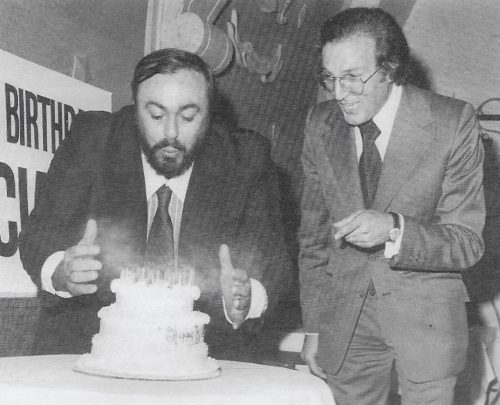Classic Italy on Monroe Street
By Megan McKinney
Birthday candles on the cake presented to him by Italian Village’s Ray Capitanini were no match for the powerful lungs of Luciano Pavarotti.
In our last issue, we presented a collection of vintage photographs of powerful personalities associated with Lyric Opera, which were assembled three decades ago for Frank Sullivan’s AVENUE M magazine.
This week, we return to both vintage Lyric and AVENUE M in a 1988 interview with Ray Capitanini, a genial member of the family that has owned Italian Village since its 1927 founding.
Chicago’s Italian Village is not merely an Italian restaurant, it is three Italian restaurants stacked vertically on West Monroe next to the Xerox Building. There is the original Village on the second floor, the newer Florentine Room on street level and La Cantina below, each with its own staff and kitchen.
Conductor Tullio Serafin, left, dean of Italian opera, who developed and coached Maria Callas, Rosa Ponselle and Joan Sutherland, with Alfredo Capitanini.
During the Carol Fox era, opera stars were Italian—that’s all there was to it—and they were accustomed to fine Italian food. Therefore, the Capitanini’s Italian Village was where they dined in Chicago. And, throughout the extravagant Fox period, Lyric paid for lavish dinners held in the Village after each opera opening.
Dinner at the Italian Village in the late 1950s. Clockwise facing the camera from this side of the table: Maestro Bruno Bartoletti, Mrs. Don Maxwell, Conductor Gianandrea Gavazzeni, Tito Gobbi, his wife, Tilde, Pino Donati, Carol Fox, Luigi Landini (standing) and Dr. Larkin Flanagan, Carol’s husband at the time.
Ray Capitanini remembered those Opening Nights: “When the stars walked in, everyone would applaud. It was like taking a final bow. Everyone was excited and would want to eat what they were eating.”
The Village had two private dining rooms, one seating 10 and the other 16, where Carol Fox would preside at dinner meetings and parties. It also had wonderful little dens and hideaways—useful in Lyric’s early days.
According to Capitanini, “When Lyric was founded, Maria Callas and Renata Tebaldi were the two reigning prima donnas. We kept them in different parts of the restaurant.” Tebaldi would arrive trailing an entourage, her secretary, her beloved mother, Giuseppina, her dresser-companion and her toy poodle. The Tebaldi ménage would arrive at around 1 in the afternoon for a light meal and then again after the performance for more substantial fare.
Giuseppe Di Stefano, restaurant manager Luigi Landini and Renata Tebaldi.
Tebaldi, like many opera stars of the era, was devoted to restaurant manager Luigi Landini. One day in 1957, he received a telephone call from the distraught diva. “My mother has died. Could you please come to New York?” she wailed. He did so, took charge and made arrangements for the funeral and the return of her body to Italy.
A telling anecdote in the colorful Maria Callas legend is said to have occurred at Italian Village. Although she was then married to a very wealthy man and was being paid double the Metropolitan Opera ceiling by Carol Fox, Callas still operated within a poverty mentality. One night, after a lengthy post-performance dinner, her husband, Giovanni Battista Meneghini, paid the check and put a cash tip on the table. He excused himself to make a telephone call, and, while he was away, Callas pulled several dollars from the tip money and stuffed them into her handbag.
Callas and Giuseppe Di Stefano relaxing backstage at Lyric during rehearsals for the 1955 production of I Puritani.
Giuseppe Di Stefano, who toured with Callas and sang opposite her in I Puritani in 1955, was lunching upon a steak at the Village before the opera one afternoon, when a minor kitchen fire produced clouds of smoke and the raucous arrival of firemen.
The tenor pulled two pieces of bread from a basket, clapped them around the steak and ran out calling, “See you after the performance.”
At an early Village dinner, left to right, co-Lyric founders Lawrence V. Kelly and Carol Fox were joined by prominent Chicagoans Nathaniel Leverone and Norman Ross.
Tito Gobbi, a painter as well as singer, and his wife, Tilde, were fixtures at the Village. One night, at one of Carol Fox’s parties in the back room, Gobbi sketched a caricature of the Lyric founder on a dinner plate, which she adored. She took it home with her and delighted in his witty image of her until her death in 1981.
Italian Village continued to be a favorite of opera stars—even though their meals have not been underwritten by the Lyric for many years. Luciano Pavarotti, who was a regular when in town, loved celebrating his birthday there and asked for takeouts of his favorite sauces.
Ray Capitanini pouring wine for Anna Maria Alberghetti.
The most enduring Italian Village/Lyric Opera tradition continued for many years on Thanksgiving Day, when the three restaurants were closed and the Lyric dark on the fourth Thursday of November.
Around 2 in the afternoon, the principals from two—and sometimes three—operas gathered at the Monroe Street institution for cocktails. Ardis Krainik did the seating, and she and Maestro Bruno Bartoletti proposed toasts and gave speeches, noting that Thanksgiving is a family tradition and Lyric, a family. They then toasted their hosts—the Capitanini family.
Photo Credit: Italian Village
Author Photo: Robert F. Carl
















